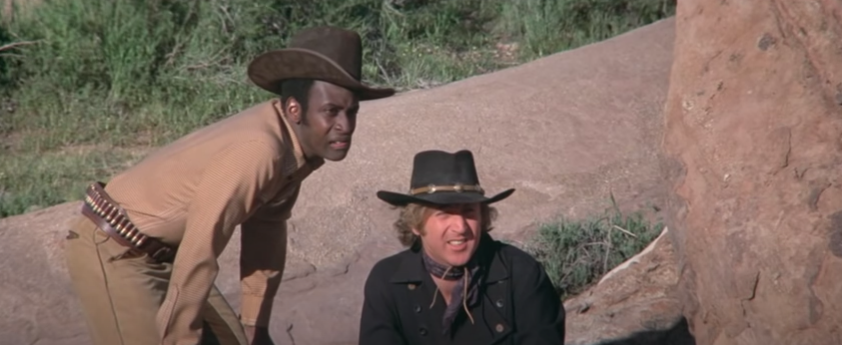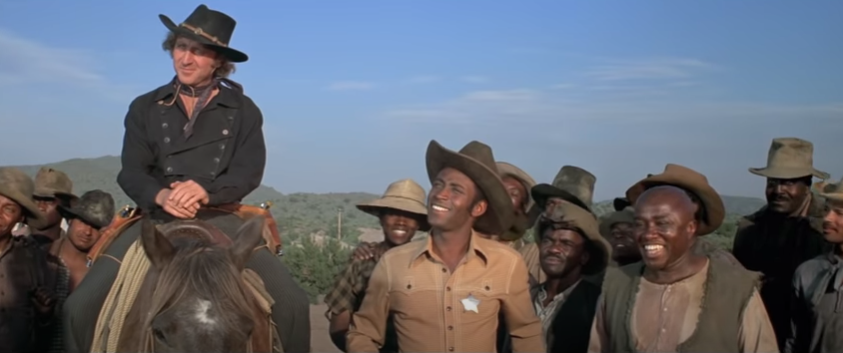Is 'Blazing Saddles' Racist? Why 'Blazing Saddles' Isn't 'Gone with the Wind'
Updated June 10 2020, 9:34 p.m. ET

Due to the fact that Gone with the Wind has temporarily been pulled from HBO Max due to its depiction of a rosy, slave-owning antebellum South, a new, strange rallying cry has started up on Twitter saying to ban Blazing Saddles next. While it's widely believed that Gone with the Wind has very racists portrayals of slave labor, is Blazing Saddles really racist as well?
Here's why some are saying equating one film with the other is not a good analogy.

Is 'Blazing Saddles' really racist? Let's take a look at the subject matter.
If anyone has ever sat through a Mel Brooks movie, they know that a lot of what he depicts likely wouldn't fly in today's theaters. The man literally had a song and dance number about the Inquisition in History of the World, Part 1. He named Black men Ahchoo and Ahsneeze in Robin Hood: Men in Tights. There's literally a musical called "Springtime for Hitler" in The Producers.
So if you were to list all these aspects of his movies out, wouldn't they be racist or anti-semitic or sexist? So, why, over all these years, have these movies continued to be praised and why isn't Mel Brooks canceled? Well, it's because you'd be hard pressed to find many people who do actually believe that his movies are promoting or praising racism, anti-semitism, or sexism.
In the case of Blazing Saddles, Cleavon Little played Sheriff Bart, the lone Black man in a sea of very, very racist townspeople who only want to associate with the sheriff when they need something from him. Bart is the hero. The townspeople are wrong and, in the words of Gene Wilder's' character, Jim aka The Waco Kid, they're all "just simple farmers. These are people of the land. The common clay of the new West. You know — morons."
Mel Brooks called in Richard Pryor to work on the film.
In an interview with Rolling Stone in 2016, Mel explained how getting the film started worked. He received a script from Andrew Bergman and then called Andrew up and asked if he would be willing to work with him on it, while also saying, "We need a black guy. Otherwise, we can’t use the N word, and we’ve gotta use the N word many, many times."
When interviewer David Fear asked why he felt the need to use that word, Mel explained, "Well, because the idea of a black sheriff — which Andy already had in his first draft — is great, but all the bad guys are going to call him that. He had a hero who spoke like a 1974 resident of Harlem in a Western town in 1874. I mean, the juxtaposition of it was just great. But you know, if we’re going to do this, we’re going to need permission. I don’t want to cross lines I’m not supposed to be crossing."

So Mel called up his friend, renowned comedian Richard Pryor. He recalled, "I said, 'Richard, read this, tell me what you think.' He read it and said, 'Yeah, this is good … this is real. I like this.' I asked, 'Right, but what about the N word? We can’t say this so many times …' 'Well, Mel, you can’t say it. But the bad guys can say it. They would say it!' Then I asked him to come write it with us, and he said sure. That was how it started."
It should be noted that not only do the "bad guys", aka the bad cowboys, say the N word, but also the townspeople. This includes a very old woman who calls Sheriff Bart the word to his face, which further shows that the bad guys aren't simply the cowboys as much as they are all the racists in the film.

Mel also noted that Richard was originally set to play Sheriff Bart but Warner Brothers believed him to be too controversial so they refused to hire him. Although Mel threatened to walk if Richard wasn't cast, Richard convinced him to stay and, together, they found Cleavon to take the role.
Although the studio initially wanted to pull the film after they discovered what kind of language Mel was using, Vice President in Charge of Production at Warner Brothers John Calley convinced them to wait to see how the audience reacted in sneak previews. Because of how positive the audience reception was, they decided to release the film to the public.
If you are looking for ways to donate your time or money to Black Lives Matter and other antiracist organizations, we have created a list of resources to get you started.